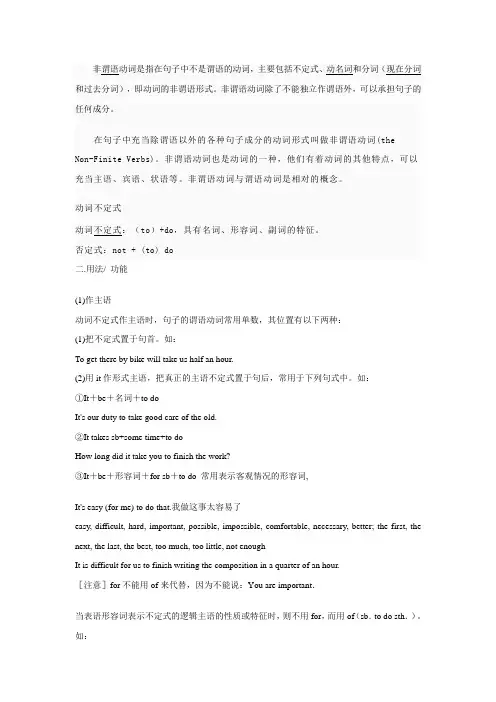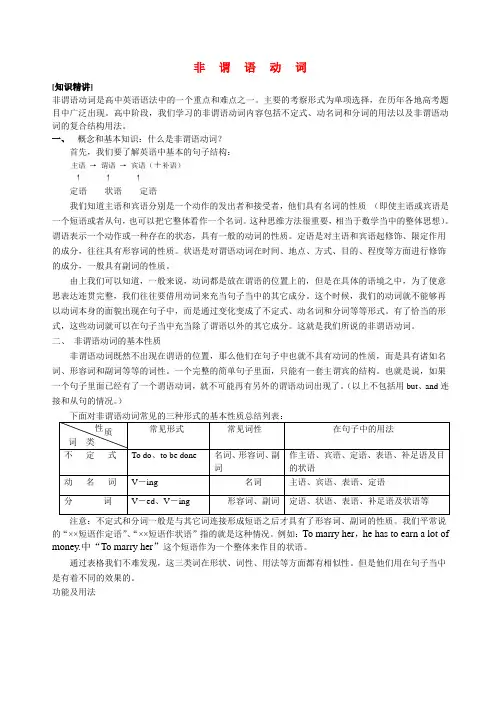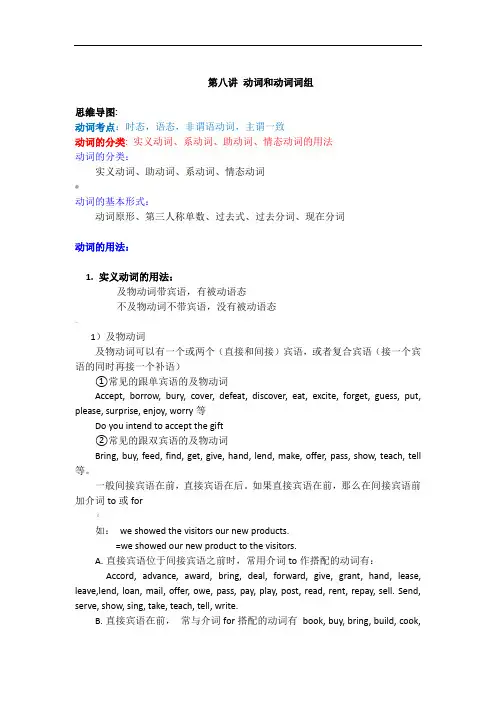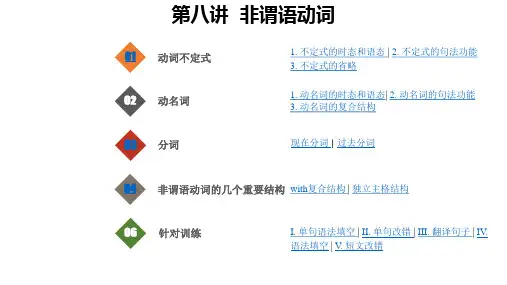第八讲 非谓语动词
- 格式:doc
- 大小:106.00 KB
- 文档页数:12



非谓语动词是指在句子中不是谓语的动词,主要包括不定式、动名词和分词(现在分词和过去分词),即动词的非谓语形式。
非谓语动词除了不能独立作谓语外,可以承担句子的任何成分。
在句子中充当除谓语以外的各种句子成分的动词形式叫做非谓语动词(theNon-Finite Verbs)。
非谓语动词也是动词的一种,他们有着动词的其他特点,可以充当主语、宾语、状语等。
非谓语动词与谓语动词是相对的概念。
动词不定式动词不定式:(to)+do,具有名词、形容词、副词的特征。
否定式:not + (to) do二.用法/ 功能(1)作主语动词不定式作主语时,句子的谓语动词常用单数,其位置有以下两种:(1)把不定式置于句首。
如:To get there by bike will take us half an hour.(2)用it作形式主语,把真正的主语不定式置于句后,常用于下列句式中。
如:①It+be+名词+to doIt's our duty to take good care of the old.②It takes sb+some time+to doHow long did it take you to finish the work?③It+be+形容词+for sb+to do 常用表示客观情况的形容词,It's easy (for me) to do that.我做这事太容易了easy, difficult, hard, important, possible, impossible, comfortable, necessary, better; the first, the next, the last, the best, too much, too little, not enoughIt is difficult for us to finish writing the composition in a quarter of an hour.[注意]for不能用of来代替,因为不能说:You are important.当表语形容词表示不定式的逻辑主语的性质或特征时,则不用for,而用of(sb.to do sth.)。


非谓语动词[知识精讲]非谓语动词是高中英语语法中的一个重点和难点之一。
主要的考察形式为单项选择,在历年各地高考题目中广泛出现。
高中阶段,我们学习的非谓语动词内容包括不定式、动名词和分词的用法以及非谓语动词的复合结构用法。
一、概念和基本知识:什么是非谓语动词?首先,我们要了解英语中基本的句子结构:主语→ 谓语→宾语(+补语)↑ ↑ ↑定语状语定语我们知道主语和宾语分别是一个动作的发出者和接受者,他们具有名词的性质(即使主语或宾语是一个短语或者从句,也可以把它整体看作一个名词。
这种思维方法很重要,相当于数学当中的整体思想)。
谓语表示一个动作或一种存在的状态,具有一般的动词的性质。
定语是对主语和宾语起修饰、限定作用的成分,往往具有形容词的性质。
状语是对谓语动词在时间、地点、方式、目的、程度等方面进行修饰的成分,一般具有副词的性质。
由上我们可以知道,一般来说,动词都是放在谓语的位置上的,但是在具体的语境之中,为了使意思表达连贯完整,我们往往要借用动词来充当句子当中的其它成分。
这个时候,我们的动词就不能够再以动词本身的面貌出现在句子中,而是通过变化变成了不定式、动名词和分词等等形式。
有了恰当的形式,这些动词就可以在句子当中充当除了谓语以外的其它成分。
这就是我们所说的非谓语动词。
二、非谓语动词的基本性质非谓语动词既然不出现在谓语的位置,那么他们在句子中也就不具有动词的性质,而是具有诸如名词、形容词和副词等等的词性。
一个完整的简单句子里面,只能有一套主谓宾的结构。
也就是说,如果一个句子里面已经有了一个谓语动词,就不可能再有另外的谓语动词出现了。
(以上不包括用but、and连接和从句的情况。
)注意:不定式和分词一般是与其它词连接形成短语之后才具有了形容词、副词的性质。
我们平常说的“××短语作定语”、“××短语作状语”指的就是这种情况。
例如:To marry her,he has to earn a lot of money.中“To marry her”这个短语作为一个整体来作目的状语。




第八讲动词和动词词组思维导图:动词考点:时态,语态,非谓语动词,主谓一致动词的分类: 实义动词、系动词、助动词、情态动词的用法动词的分类:实义动词、助动词、系动词、情态动词@动词的基本形式:动词原形、第三人称单数、过去式、过去分词、现在分词动词的用法:1. 实义动词的用法:及物动词带宾语,有被动语态不及物动词不带宾语,没有被动语态…1)及物动词及物动词可以有一个或两个(直接和间接)宾语,或者复合宾语(接一个宾语的同时再接一个补语)①常见的跟单宾语的及物动词Accept, borrow, bury, cover, defeat, discover, eat, excite, forget, guess, put, please, surprise, enjoy, worry等Do you intend to accept the gift②常见的跟双宾语的及物动词Bring, buy, feed, find, get, give, hand, lend, make, offer, pass, show, teach, tell 等。
一般间接宾语在前,直接宾语在后。
如果直接宾语在前,那么在间接宾语前加介词to或for《如:we showed the visitors our new products.=we showed our new product to the visitors.A.直接宾语位于间接宾语之前时,常用介词to作搭配的动词有:Accord, advance, award, bring, deal, forward, give, grant, hand, lease, leave,lend, loan, mail, offer, owe, pass, pay, play, post, read, rent, repay, sell. Send, serve, show, sing, take, teach, tell, write.B.直接宾语在前,常与介词for搭配的动词有book, buy, bring, build, cook,cash, cut, design, fetch, find, fix, get, guarantee, keep, leave, make, mix, order, paint, pick, play, pour, prepare, set, reserve, save, secure, sing, spare, take, win, write等C.有一些动词不能接to或for,只能放在直接宾语前Allow, ask, bet, cause, charge, cost, deny,draw, envy, forgive, promise, refuse 等She wished them a safe journey.她祝你们一路平安。


动名词和分词用法动名词是动词的一种非谓语形式,由动词+ ing构成,有一般式和完成式,主动式和被动式,否定形式为not doing,具有动词和名词的性质,在句中起名词作用,可作主语、宾语、表语和定语、状语和宾补。
(1)动名词作主语(动名词做主语谓语动词用单数)动名词作主语表示抽象动作,指一件已知的事或经验。
eg:①Driving a car on the crowded road is boring. ②Reading is my hobby.句型: It’s no use/no good doing sth 做.......没有用处/好处It’s a waste of time doing sth 做.... 浪费时间(2)常只用动名词作宾语的动词有:admit,avoid,appreciate,consider,dislike,enjoy,escape,excuse,finish,imagine,keep,mind,miss,practise, risk,resist,suggest等。
eg:①I can’t imagine marrying her. ②She managed to escape being punished.以下动词词组后面只接动名词作宾语:give up,belong to,look forward to,keep on,insist on,be busy,get down to,be devoted to,have difficulty/trouble(in),have a good/wonderful time (in)等。
eg:①I’m looking forward to hearing from you soon. ②He gave up smoking three years.(3)动名词作表语动名词作表语的时候,特别要注意:不要与正在进行时混淆。
动名词作表语,表达的是“某件事”等。
非谓语动词语法讲解一、非谓语动词的概念动词的基本用法是作谓语。
当句中已经有了谓语动词了,要选或要填的动词就只能用非谓语形式了。
非谓语形式有三种:1、动词不定式:to do 2、动词的ing : doing 3、动词的过去分词:done二、三种形式的含义(基本用法)不定式:表示目的和将来;动词的ing:表示主动和进行;过去分词:表示被动和完成。
三、非谓语动词的时态和语态一般式完成式进行式不定式主动to do to have done to be doing被动to be done to have beendoneing 形式主动doing having done 被动being done having beendone过去分词被动done四、非谓语动词的否定形式在非谓语动词前加not, never. 即 not / never to do, not / never doing五、非谓语动词的复合结构不定式的复合结构:for / of sb. to do sth.动词 ing 形式的复合结构:宾格或所有格+doing (-ing 形式作主语时,用的所有格+doing)六、非谓语动词的做题步骤1、判定是否用非谓语形式。
方法:看看句子中是否已有了谓语动词了2、找非谓语动词的逻辑主语。
方法:非谓语动词的逻辑主语一般是句子的主语。
3、判断主被动关系。
方法:非谓语动词与其逻辑主语的主动还是被动关系。
4、判断时间关系。
方法:分析句子,看看非谓语动词所表示的动作发生在谓语动作之前、之后还是同时。
之前常用 done; 之后常用to do; 同时常用doing.学习非谓语形式时,建议把三种形式一起来比较学习,会更加有效一些。
七、非谓语动词作主语和表语的比较1、不定式和动名词作主语和表语a. 不定式表示一次性的、具体的动词。
动词ing 常表示一般的、泛指的或习惯性的动作。
如:________ is a good form of exercise for both young and old.A. The walkB. WalkingC. To walkD. Walk(分析) a good form 暗示泛指一般的行为,用动名词作主语,选 Bb. 不定式作主语时,常用it 作形式主语,即用句型:It is + adj. / n. + (for / of sb. ) to do sth.It’s important for us to learn English well.It’s kind of you to help us.注意:下面几个句型是用动名词:It’s no good / use doing sth.It’s usel ess doing sth.There is no need to do sth.2、不定式、动名词、分词作表语的比较1、不定式、动名词作表语,.表示主语的内容。
第八讲非谓语动词在句子里作为谓语出现的动词,称为限定动词;不作为谓语出现的动词称为非限定动词或非谓语动词。
限定动词在句中作谓语受主语的人称和数的限制;非限定动词不可单独用作谓语,不受主语的人称和数的限制,所以又称动词的非谓语形式。
非限定动词具有双重性质,即一方面保留着动词的某些特征,如可以有自己的宾语、状语等构成非限定动词短语,还可以有时态和语态的变化;另一方面又具有名词、形容词和副词的某些特征,在句中可以担任主语、宾语、表语、定语和状语等。
英语的非谓语动词有三种形式:不定式、动名词和分词。
其中-ed分词没有时态和语态的变一、动词不定式1. 动词不定式的句法功能1) 作主语。
多表示具体的或未来的动作。
例如:To see is to believe. 百闻不如一见。
To err is human. 犯错误是人之常情。
To persevere means victory. 坚持就是胜利。
在现代英语中,常用it作形式主语,而把真正的主语动词不定式(或短语) 放在谓语之后。
特别当句子的不定式主语太长时,为避免结构上的头重脚轻,多采用it 形式主语句。
常见的这类结构有:a. 形如It is easy (hard, difficult, right, wrong, necessary) to do sth.。
如:It is difficult to finish the work. 完成这项工作是困难的。
It must be hard to live only on your salary. 仅靠工资生活,日子一定很艰苦。
b. 形如It is a pleasure (an honour, a pity, fun, no easy job) to do sth.。
如:It is great fun to go swimming in the sea. 在大海里游泳很痛快。
c. 形如It takes sb. (some time) to do sth.。
如:It took me almost two hours to cover the whole distance. 走完全程花了我两个小时。
It costs nothing to be polite. 讲礼貌无需代价。
It always pays to tell the truth. 说实话总是不会吃亏的。
2) 与助动词一起组成谓语。
例如:The letter is to be handed to Mr. Wilson himself. 这封信将被交给威尔森先生本人。
I was just about to leave when the phone rang. 我正要离开时,电话响了。
I’m going to sell this old car and buy a new one. 我打算卖掉这部旧车,买辆新的。
3)作表语。
例如:His wish is to be a doctor. 他的愿望是当一名医生。
What surprised me most is to hear him ill. 最让我吃惊的是听说他病了。
4) 作宾语。
有些及物动词常跟不定式作宾语,如agree, apply, ask, love, like, prepare, help, want, decide, hope, manage, plan等。
例如:He wanted to borrow my bike. 他想借我的自行车。
What do you plan to do for the weekend? 这个周末你打算干什么?5) 作定语。
放在其所修饰的名词或代词之后。
例如:He was always the first to come and last to leave the office.他总是第一个到办公室,最后一个离开办公室。
He has an important meeting to attend. 他有个重要的会议要参加。
6) 作状语。
表示目的,原因,结果等。
例如:We eat to live, not live to eat. 我们吃饭是为了活着,但活着不是为了吃饭。
(目的)He felt relieved to have solved the tough problem. 解决了那个难题,他感到欣慰。
(原因)You wouldn’t do that to save your life. 即使为了救自己的命也不能那样做。
(让步)7)作补足语。
例如:I want you to be happy. 我要使你幸福。
The manager will leave me to attend the matter when he is out.经理不在时会托我照管事务。
8) 作独立成分能够作独立成分的不定式短语往往形成了固定的形式和用法,如to begin with (首先), to be frank (坦率地说), to be brief (简言之), to be exact (精确地说), to tell you the truth (老实说), to make / cut a long story short (长话短说), to put it another way (换句话说), to get back to the point (言归正传), so to speak (可以这么说),等等。
例如:The rush work was completed in less one day——six hours, to be sure.这一大堆活不到一天——确切地说只有6个小时就做完了。
To tell you the truth,the film was a great disappointment to me.老实说,那部电影令我大失所望。
2. 动词不定式的否定形式不定式的否定式由“not或其他否定副词never, hardly 等+ 动词不定式”构成。
例如:Not to be moved by the story would require a heart of stone.不为之所感只需要有铁石心肠。
He promised never to tell a lie again. 他保证今后绝不再说谎。
Fugitives were nowhere to be seen. 到处都看不到有逃亡者。
The changes in her personality are so trivial as hardly to be noticed.她的个性中的变化很微小,几乎不能引起注意。
3.“疑问词+ 动词不定式”结构构成这种结构的疑问词有who / whom, what, which等疑问代词和where, when,whether,how等疑问副词。
它在句中可用作主语、宾语、表语、介词宾语、补足语、同位语及双重宾语等。
例如:How to earn daily by my pen was then the problem.如何靠我的笔吃饭在当时是个难题。
(主语)He did not know whether to go there or not. 他不知道是否该去那里。
(宾语)One of the main problems of this country is how to control the rapidly increasing population.这个国家主要问题之一是如何控制快速增长的人口。
(表语)They exchanged views on the question of who to elect.他们就选谁这个问题交换了看法。
(介词宾语)We dislike being told what to do and what not to do.我们不喜欢被别人指使着做什么或不做什么。
(主补)Will you advise me where to stay? 你会建议我住哪吗?(宾补)The problem how to put right the mistakes of the past is not our only problem.如果纠正过去错误,并不仅是我们的问题。
(同位语)I can tell you where to get this book. 我可以告诉你在哪买这本书。
(直宾)此外,“介词+ 关系代词+ 不定式”结构还能用作定语。
如:She is a nice person with whom to work. 她是一个很好共事的人。
There is no key with which to open the door. 没有开这扇门的钥匙。
4. 使用动词不定式需要注意的一些问题1) 不定式作使役动词let, make, have等和感官动词see, watch,, notice, look at, observe, hear, listen to, feel等的宾语补足语时一般不带to:动词help后的不定式可以带to, 也可以不带to。
在被动语态中作补语的不定式to不能省略。
例如:I saw him leave the room. 我看见他离开了房间。
He was seen to leave the room. 有人看见他离开了房间。
Could you help me (to) lift the box? 请你帮助我抬抬这个箱子好吗?2) 介词except, but之后跟不定式作宾语时,如果介词前有动词do的某种形式,可以省略to;反之不定式要带to。
例如:She will do anything but help the boy with his lessons.She wanted nothing except to stay here.3) 当主语是all或是what引导的名词性从句,主语受only, first, one, least或形容词最高级修饰,且主语部分有实义动词do的某种形式时,作表语的不定式可带也可不带to。
例如:What I want to do is (to) give them more help. 我想做的就是给予他们更多的帮助。
The only thing you have to do is (to) stay home and sleep all day.All he does is gossip about others.The least you can do is help up a little.4) 在had better, would rather /sooner (…than), cannot but, cannot help but, do nothing but, might (just) as well, why (not)…等结构中不定式to也要省去。